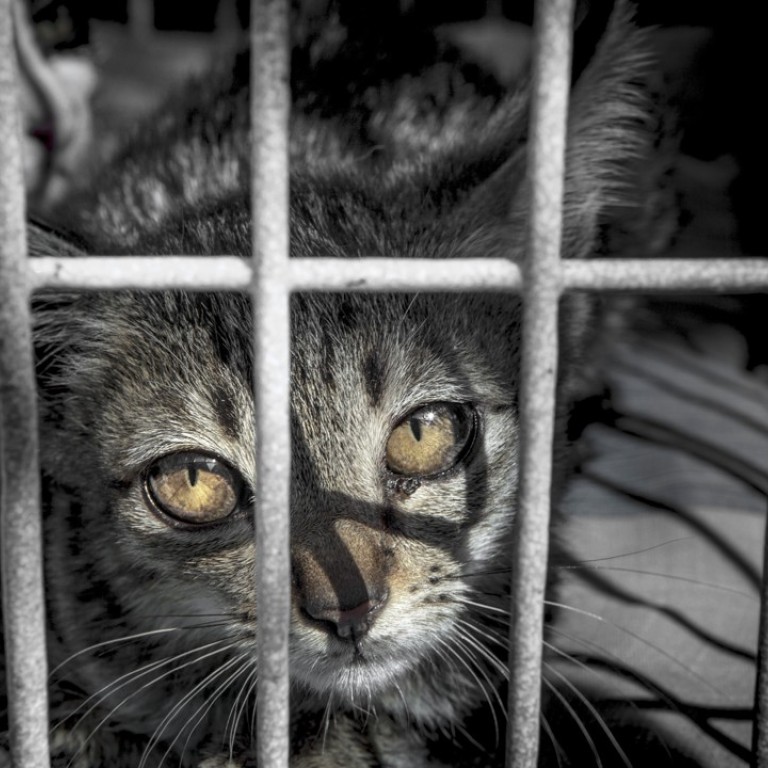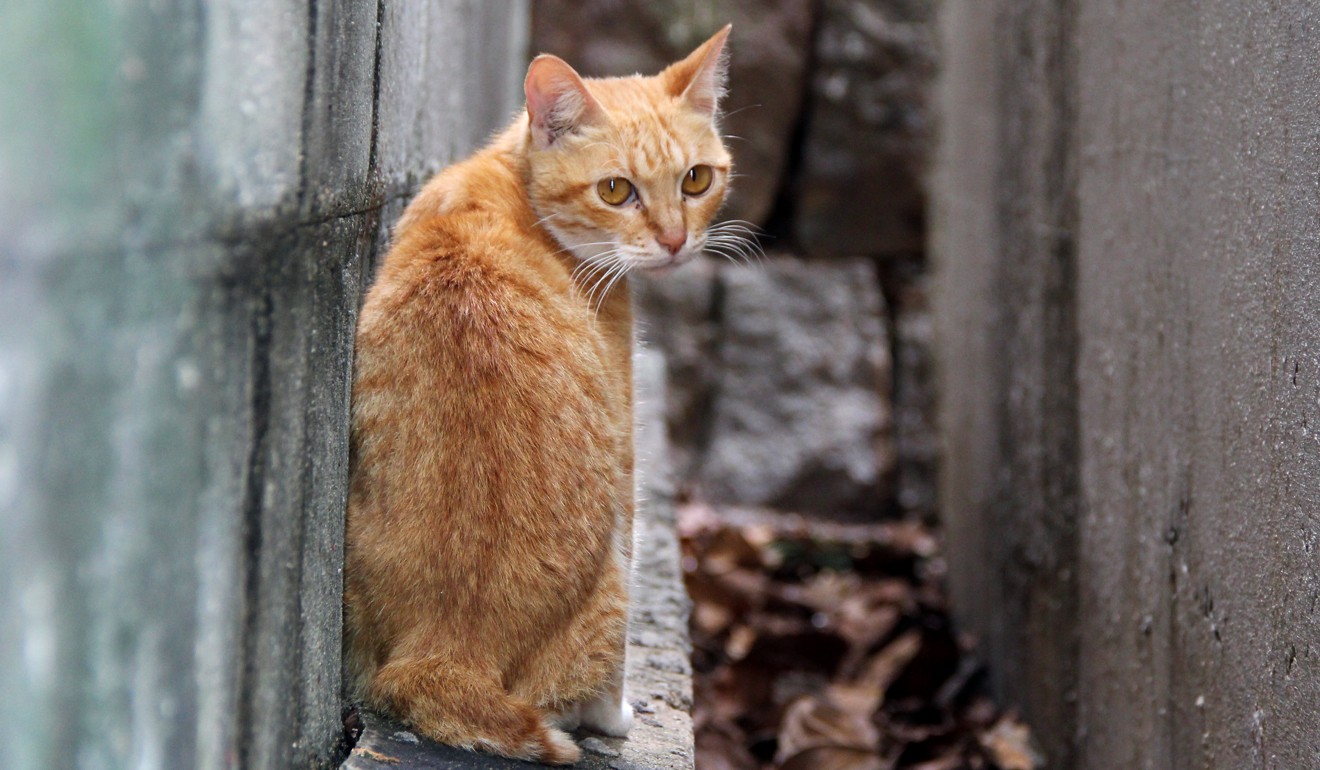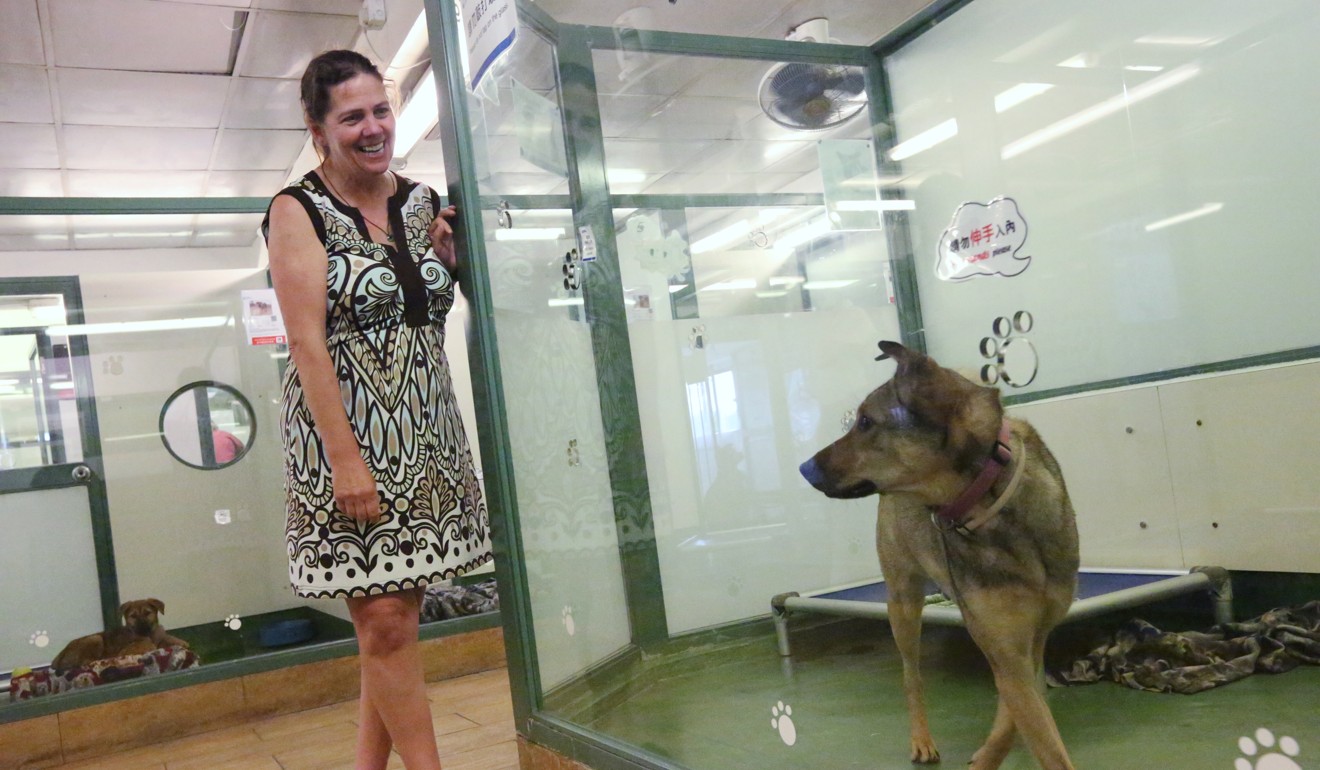
Animal cruelty police force needed in Hong Kong, experts say, after shocking cases exposed online
Social media increasingly being used to shed light on abuse, but perpetrators are rarely prosecuted, activists argue
On the night of September 7, 2013, more than a thousand Hongkongers, some in tears, gathered outside the government’s headquarters at Tamar calling for stricter regulations to stop animal cruelty and a dedicated police unit to enforce those rules.
The rally was prompted by a shocking case in which a four-month-old stray cat was found in Tsuen Wan with one of its legs cut. Police later arrested a couple on suspicion of animal cruelty, but did not press charges due to “insufficient evidence”.
In the past four years, Hong Kong has done little to make animals better off, according to activists and law experts. No animal police squad has been set up, but more cruelty cases have been exposed, mainly by social media users.
Outrage online after man filmed throwing and kicking dog in Hong Kong supermarket
Experts said the recent case of a man throwing and kicking a dog in a Tuen Mun supermarket showed that current loose regulations were not serving as sufficient warnings for would-be offenders.
“The main problem is that we still don’t have a duty of care,” said Amanda Whitfort, an associate professor at the University of Hong Kong’s faculty of law.

Last year the government’s Agriculture, Fisheries and Conservation Department (AFCD) received 4,318 dogs and cats – mostly strays and those whose owners had given them up.
Hong Kong’s leading animal welfare charity, the Society for the Prevention of Cruelty to Animals (SPCA), also collected or rescued 5,870 abandoned animals in the 2015-16 financial year, its annual report said.
Putting the power of the paint brush to work for animal rights: Hong Kong artist targets Asia’s dog meat trade
“If you observe an animal that has been neglected, it’s in a situation where its welfare needs are not being met,” Whitfort said. “If you call the SPCA, the police or AFCD, what do you think they’re going to be able to do about it? Absolutely nothing.
“Until that animal shows overt signs of cruelty – being malnourished, so sick that it needs to see a vet – then there is nothing that they can do because we don’t have any requirement that animals get a minimal reasonable standard of care in Hong Kong.”

One issue arising from abandoned pets is that thousands of them are being euthanised each year. Figures show the AFCD painlessly killed 2,263 dogs and cats last year, while the SPCA, which has been criticised by animal lovers who said it had been failing to fulfil its mission of promoting kindness, euthanised 1,685 animals in 2015-16.
But the SPCA’s deputy director (welfare) Fiona Woodhouse said it was “appropriate” to euthanise an abandoned animal if it was in the correct context and suffering badly.
Young Hong Kong pet protection group goes extra mile to match animals with the right homes
“Quite a few of the animals we see are abandoned at the end of their life, suffering in old age, maybe suffering from terminal cancer or have been hit by cars and paralysed. In those instances, euthanasia as applied in the context is correct,” Woodhouse said.
In their 2010 review of animal welfare legislation in Hong Kong, Whitfort and Woodhouse suggested wide-ranging reforms of the city’s anti-cruelty laws, including imposing a positive duty of care on all persons in charge of animals.

But “nothing has changed” since the review, according to Whitfort, apart from a new regulation on animal traders earlier this year that required every dog breeder to have a licence.
Whitfort said that although the review had led to greater awareness in the community, the many acts of animal neglect and cruelty reported by the public to authorities every day could not be addressed under the current laws.
Outdated law is a barrier to developing an animal-friendly Hong Kong
According to the Prevention of Cruelty to Animals Ordinance, any person who cruelly harms an animal faces a maximum penalty of three years in jail and a HK$200,000 fine. But unless an animal shows signs of physical harm, it is unlikely that person will be prosecuted.
Whitfort said “there was nothing in the law to cover situations where an animal is not provided with adequately nutritious food, constant access to water, appropriate shelter, timely vet care, adequate exercise or other reasonable standards of care”.

Currently, 13 out of 23 police districts in Hong Kong have designated investigation teams to look into animal cruelty cases. But a document from the city’s legislature covering the first six months of last year showed only four people were prosecuted out of 32 reports relating to animal cruelty in the period.
Animal rights activist Mark Mak Chi-ho, an executive chairman of the non-profit Veterinary Services Society, said the police had taken a passive role in handling animal cruelty despite the rise of social media putting pressure on officers to take action.
Cat killers get Hong Kong's longest ever jail sentence for animal cruelty
“Social media plays a very important role in animal protection,” he said. “Because animals won’t come forward. We need to catch the bad acts with smartphones and cameras, since animal cruelty is hard to prove.”

Roy Kwong Chun-yu, who holds the seat in the Legislative Council for the district council (second) constituency, agreed, but said condemning abusers online was not the best solution.
“By the time we see animals online getting abused, they have already been hurt ... That’s not how animal protection works,” he said.
Citing Taiwan as an example, Kwong said setting up an animal protection police squad could send a clear message to society that the force was taking cruelty cases seriously.
Eating dog meat in China might only be an annual affair, but why does such sick tradition continue?
Both Mak and Kwong suggested the 29,000-strong force select 30 serving officers committed to animal protection to form a squad with cruelty prevention as their secondary duty.
A police spokeswoman said the force was “committed” to combating acts of cruelty to animals.
Kwong was confident the city could improve its animal protection record in the next five years. Quoting Indian spiritual and political leader Mahatma Gandhi, he added: “The greatness of a nation can be judged by the way its animals are treated.”
Three animal abuse cases that shocked Hong Kong
Trainer gets community service for hitting dog with metal rod
Dog trainer Li Wing-hong was captured on video whacking a shiba inu with a metal rod 14 times during its feeding last year. The clip played in court showed Li, who is in his 30s, presenting a bowl of food to the dog and giving it the go-ahead to eat. When the dog does not comply, Li is seen hitting the animal repeatedly with a long metal stick. Li told the court he did it on the spur of the moment and that he was only trying to tame the animal. He had been under a lot of pressure at work at the time, he said. But the magistrate did not buy his explanation, saying that Li could have trained the dog without subjecting it to psychological trauma. Li was sentenced to 120 hours of community service.
Factory worker gets HK$1,000 fine for skinning relative’s cat
Vegetable factory worker Tang Xunguang last year pleaded guilty to one count of using the flesh of a cat for food. Tang and Shu Xingqiao, his relative and the owner of the cat, were arrested on January 31 on animal cruelty charges after two police officers saw the man skinning a hanging cat next to the woman who was torching the animal with a liquefied petroleum gas gun outside a village house in Pat Heung, Yuen Long. The court heard Tang had told investigators the cat had died in the cold and he had planned to cook the animal for his dog. Shu and Tang were both fined HK$1,000 each last November.
Alcoholic Hong Kong worker sentenced to jail for bestiality
Construction worker Chung Lin-fai, 58, was sentenced to seven months in jail in April for having sex with a female mongrel as well as for assaulting a reporter. The court heard Chung had enticed the mongrel with bread in Tung Chung on February 1. He bathed the dog before engaging in the indecent act. The case was reported to police after a woman heard from an eyewitness that the canine had disappeared for two hours after being fed by a man, and it was then taken to a veterinary clinic for treatment. His lawyer said Chung, an alcoholic, suffered from work-related injuries and a hearing impairment and had lost his job since the case came to light.
Here to help:
Thousands of abandoned animals in Hong Kong are euthanised every year by the government’s Agriculture, Fisheries and Conservation Department. Although the department says only animals found to be unsuitable for rehoming due to health or temperament reasons, or that cannot be rehomed by animal welfare organisations, will be “put to sleep”, the practice has been fiercely criticised by animal lovers. Many non-profit and animal welfare groups have been set up to give abandoned pets a second chance at life. Here are a few which have contributed to protecting animal rights in Hong Kong.
Lifelong Animal Protection Charity
Background: The charity rescues animals and provides medical care such as vaccinations and desexing procedures. It also helps abandoned animals find foster homes and facilitates adoptions. The charity, founded in 2003, offers school talks for young people and training courses for employers to educate the public on animal rights and welfare.
Vision and mission: It aims to help animals in Hong Kong and to bring about the conditions whereby every animal has a good home.
Hong Kong Dog Rescue (HKDR)
Background: The non-profit organisation was founded in 2003 specifically for saving dogs and puppies from the Agriculture, Fisheries and Conservation Department, as abandoned animals will be euthanised. Its founder Sally Anderson goes to the government kennel regularly to pick up abandoned dogs, which will then be housed at its two centres in Tai Po and Ap Lei Chau, as they await adoption.
Vision and mission: HKDR is a no-kill organisation, meaning that no dog under its care will be euthanised for any reason other than when it is the only humane option.
Hong Kong Cats
Background: Hong Kong Cats helps stray, abandoned and sick cats. Like many other animal welfare organisations, the cat-friendly group relies on donations to feed and take care of the cats that it rescues. It relies on potential adopters to either temporarily foster or adopt and provide permanent homes for the abandoned cats and kittens.
Vision and mission: Its mission is to educate the public on the importance of adopting animals, rather than buying them.
Hong Kong Rabbit Society
Background: The society, founded in 2003, provides a wide range of services for abandoned rabbits, such as receiving such animals, and arranging adoption and providing sterilisation. It is estimated that around 200 pet rabbits are abandoned every year – the third most abandoned pets after cats and dogs.
Vision and mission: It aims at promoting kindness, compassion and respect towards all animals as well as the prevention of mistreatment, abuse and abandonment.


